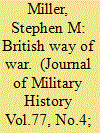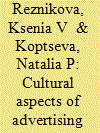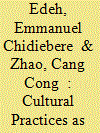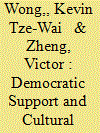|
|
|
Sort Order |
|
|
|
Items / Page
|
|
|
|
|
|
|
| Srl | Item |
| 1 |
ID:
125192


|
|
|
|
|
| Publication |
2013.
|
| Summary/Abstract |
This essay explores the impact of late Victorian cultural assumptions on the conduct of the South African War of 1899-1902, both at home and on the battlefield. It contends that three cultural values, intrinsic to late Victorian culture--cosmopolitanism, political egalitarianism, and race--shaped British soldiers' sense of justice at the outset of the war and, as a result, influenced their actions on and off the battlefield. This article emphasizes that the numerous "small wars" fought by British armies in the late nineteenth century, of which the South African War was the largest, were each unique and worthy of study not just as political history but as cultural military history
|
|
|
|
|
|
|
|
|
|
|
|
|
|
|
|
| 2 |
ID:
158056


|
|
|
|
|
| Summary/Abstract |
Advertising studies allow us not only to differentiate successful from unsuccessful marketing activities, but establish the fact as well that advertising reveals specific cultural norms that somehow differ depending on global regions. Advertising studies feature a clearly pronounced interdisciplinary nature and allow us to better understand what cultural basis specific advertising texts are made on. An advertising message is oriented on both rational and emotional-affective processes among the people perceiving the message. Modern Chinese consumers live in a complex social and cultural space. The ideology of the People’s Republic of China combines traditional philosophy, socialist ideas, and technological pragmatism. In modern China, advertising costs are skyrocketing (the year-to-year increase is about 100%). Chinese visual advertising images are based on a complex mixture of global and traditional cultural values and embody different aspects of “the Great Chinese Dream.” A visual analysis of Chinese advertisements allows us to see what traditional and global values are embodied by advertisers in advertising texts in order to render such advertising messages more effectively. Generally encountered are female images, nature-related images, and images pertaining to the ancient past of China. At the same time, ancient Chinese traditions are subject to globalization. Chinese traditional female images are created in the context of trends of mass culture. Nevertheless, the keynote remains within China’s traditional values. All the while, it features no forced separation from the global culture. It is more likely that China harmoniously includes the components considered acceptable within its own worldview.
|
|
|
|
|
|
|
|
|
|
|
|
|
|
|
|
| 3 |
ID:
186604


|
|
|
|
|
| Summary/Abstract |
China’s One Belt One Road (OBOR) centres on building a harmonious world, by reorienting the already tumultuous international community, towards the path of sustainable, peaceful and harmonious coexistence. From a cultural perspective, the OBOR is a heritage, an embodiment of brilliant civilization, glorious historic past and extraordinary creativity of mankind. It harbours both tangible and intangible representations of the values, beliefs, traditions and lifestyles of prior generations that are valuable to the present generations. Evidence of historical socioeconomic development and intricacies thrived on the exchange of cultural values shared by all mankind. By drawing from diverse conceptual frameworks embedded in traditional Chinese cultural values, the study offers an insightful illustration of cultural practices in contemporary China’s socioeconomic development through the OBOR. Capturing how cultural values underpins the socioeconomic development pattern in OBOR, geopolitical decisions and actions aimed at managing conflicts and the inclusive nature of OBOR.
|
|
|
|
|
|
|
|
|
|
|
|
|
|
|
|
| 4 |
ID:
161204


|
|
|
|
|
| Summary/Abstract |
This article examines the possible negative impacts of two East Asian traditional values—the notion of paternalistic meritocracy and the instrumental perception of ideal political arrangements—on popular support for democracy in Hong Kong and East Asian societies. Based on data drawn from various surveys, East Asians are found to be quite attached to paternalistic meritocracy and democratic instrumentalism. Comparatively, Hong Kong people are less inclined to perceive democracy in a procedural way although they are less attached to paternalistic meritocracy. Regression analysis demonstrates a negative correlation between these two values, with a preference for democracy.
|
|
|
|
|
|
|
|
|
|
|
|
|
|
|
|
|
|
|
|
|